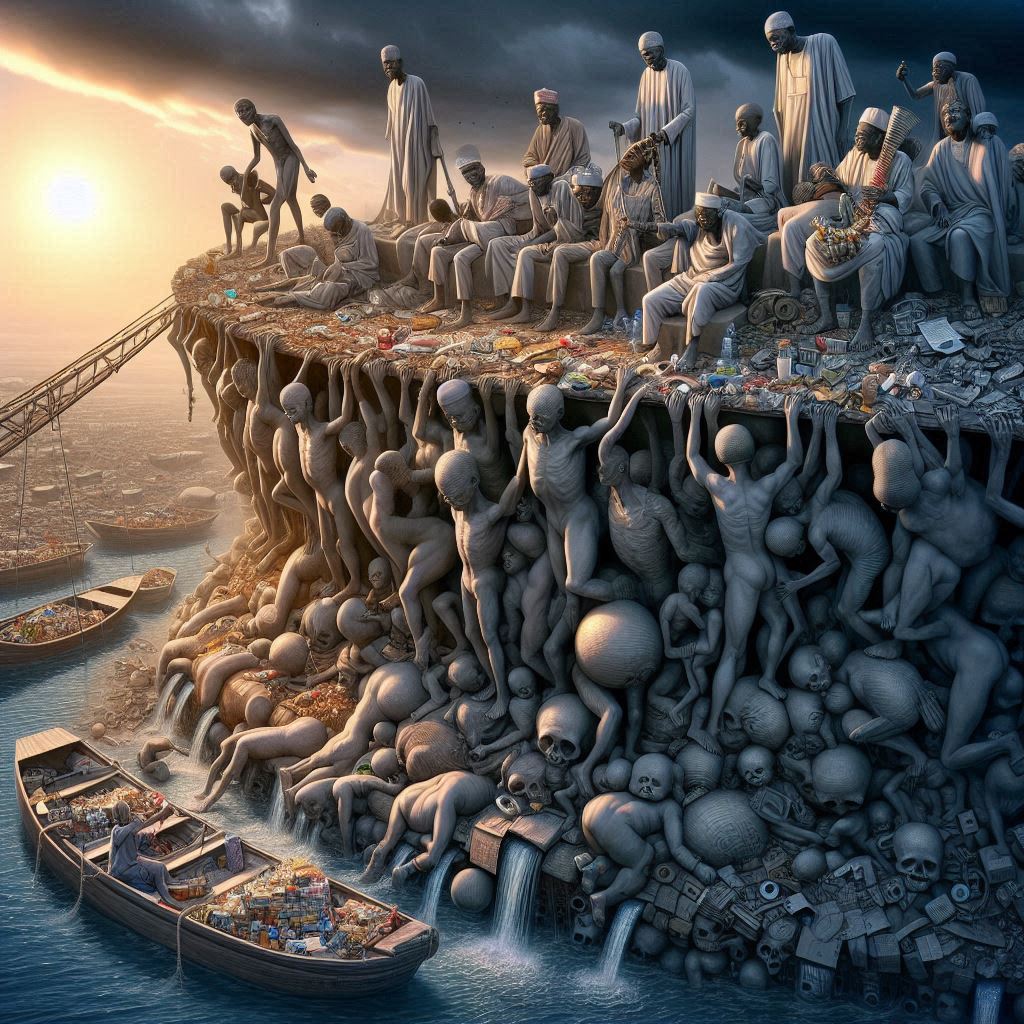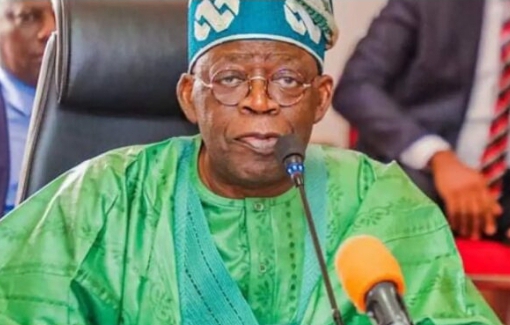Nigeria, a nation blessed with rich cultural diversity and vast natural resources, has endured a series of challenges rooted in generations of selfishness, greed, and moral decay. These different generations of wickedness have systematically undermined the country’s potential, stifling progress and prosperity. From the era of the slave traders to the modern-day quick-money culture, each generation has left a profound mark on Nigeria’s development.
This blog post will explore the different generations of wickedness that have plagued Nigeria, detailing their impact on the nation’s social and economic fabric. It will also argue for the need to confront these eras of selfishness and corruption if Nigeria is to realize its full potential.
Centuries ago, Nigeria, like many other African nations, was deeply entrenched in the horrific global phenomenon of the transatlantic slave trade. Nigerians, through betrayal, greed, and brutal selfishness, became facilitators in the trading of their people. The idea of kinship and community was sacrificed for personal gain as individuals sold their fellow Nigerians to European slave traders in exchange for material rewards. The devastation wrought by this era still lingers today.

The generation of slave traders was driven by the allure of wealth and power, and they did not hesitate to sacrifice their people for profit. Families were torn apart, villages decimated, and communities weakened. These individuals set a dangerous precedent for future generations by showing that the pursuit of personal gain, even at the cost of others’ lives and freedom, was a viable option. Though these slave traders are no longer alive, their legacy continues to haunt Nigeria. The societal fabric that was torn apart during this time has never fully healed.
The impact of this generation’s wickedness was felt both during and after the slave trade. Communities that once thrived were reduced to ruins. Traditional structures of leadership and governance were weakened as the population dwindled. The trauma of being sold into slavery had long-lasting psychological effects on those left behind. This era left a deep scar on Nigerian society, a scar that remains visible in the nation’s fractured unity and persistent underdevelopment.
Read Also: The Devastating Impact of Rampant Corruption on Nigerian
As Nigeria transitioned from colonial rule to independence in the mid-20th century, hopes were high for a brighter future. However, the leaders who inherited power from European colonial rulers quickly dashed these hopes. They perpetuated the same exploitative practices that had been imposed by the colonial powers, continuing to drain the nation’s resources for personal enrichment while neglecting the needs of the people.

These leaders, despite being Nigerian, exhibited the same ruthlessness as their colonial predecessors. Rather than seeking to uplift the nation, they prioritized their wealth and status, perpetuating the cycle of exploitation. Many of them amassed unimaginable wealth while the masses were left to languish in poverty. Their actions were a betrayal of the ideals of independence and a continuation of the selfishness and greed that had been seen during the slave trade era.
The wealth accumulated by this generation of leaders came at a steep cost to Nigeria’s development. These individuals built empires for their families, securing positions of power for their children and grandchildren while national infrastructure crumbled. Education, healthcare, and transportation systems were neglected, leaving the majority of Nigerians without access to basic services. Although these leaders have passed away, their family names continue to hold power and influence in society, a testament to the enduring legacy of their greed.
Read Also: Nigeria’s Masses Struggle with Inequality and Exclusion from the Nation’s Commonwealth.
The next generation, which emerged in the post-independence era, took the lessons of exploitation learned from their predecessors and perfected the art of corruption. This generation of leaders, civil servants, military officers, and religious figures deepened the rot within Nigeria’s governance and institutions. The pursuit of power and wealth continued to override any concern for national progress.
This generation normalized the practice of stealing from the government and the people. Whether in politics, the civil service, or religious institutions, leaders of this era saw their positions as opportunities to enrich themselves. They siphoned public funds, neglected their duties, and allowed Nigeria to sink deeper into poverty and instability. Public officials lived in luxury while the masses struggled to make ends meet. This era solidified the entrenchment of corruption as a way of life in Nigeria, making it a nearly insurmountable obstacle to progress.

The impact of this generation was felt across various sectors. Retired civil servants, military and paramilitary officials, former political office holders, and even present-day religious leaders all played a part in deepening the crisis of corruption. These individuals, many of whom are still alive and influential, continue to shape the country’s future with their corrupt practices. Their actions have left a legacy of distrust and disillusionment, as Nigerians have grown increasingly frustrated with a system that seems designed to benefit only a select few.
The corruption perfected by this generation has had a lasting impact on Nigeria’s development. The country remains plagued by underdevelopment, widespread poverty, and failing infrastructure. Many of the challenges Nigeria faces today can be traced back to the actions of this generation. Despite their retirement from active roles, their influence remains strong, and their wealth continues to control significant portions of the country’s economy.
Read Also: The Incursion of Political Merchants in Nigeria Politics
The new generation of youths in Nigeria is marked by an obsession with acquiring wealth at any cost. This quick-money culture has taken root across the country, fuelled by desperation and a lack of opportunities. Many young people have become willing to engage in criminal activities, such as Internet scams (Yahoo Boys) and ritualistic practices (Yahoo Plus), to achieve financial success. This culture of quick wealth has spread into Politics, Public Service, Police, Miltary, Para-Military, Banking, Law, Medicine, Trading, Academics, Production, and even Religious Institutions, further eroding the country’s moral foundation.
The willingness of this generation to engage in extreme acts to achieve wealth has shocked and devastated Nigerian society. Ritual sacrifices, fraudulent activities everywhere, and the manipulation of religious beliefs have become common practices among Nigeria’s youth. Many are involved in politics, public service, and religious leadership, continuing the cycle of corruption and exploitation. These acts not only harm individuals but also further undermine the moral fabric of society, leaving Nigeria in a precarious state.

The broader societal implications of this generation’s actions are dire. As more young people embrace this quick-money culture, moral values are being eroded at an alarming rate. Hard work, integrity, and honesty are increasingly being replaced by deceit, corruption, exploitation, and materialism. The impact of this moral decay is felt in every corner of Nigerian society, from the political arena to the religious pulpit. If left unchecked, this could lead to a complete collapse of social order in Nigeria.
For Nigeria to truly transform, the uprising must target these wicked generations that have so deeply harmed the country. From the generation of slave traders to the quick-money-obsessed youths of today, each era has played a significant role in Nigeria’s decline. The revolution must not be limited to political change but must also confront the deeply ingrained culture of selfishness, greed, and exploitation.
Read Also: How Nigeria’s Stolen Wealth is Shaping Its Future
The change will require a multifaceted approach. Corrupt leaders, both past and present, must be held accountable for their actions. This includes not only political figures but also those in religious institutions, the military, and civil service. Educational programs must be implemented to promote ethical leadership and discourage the quick-money culture among youths. National development strategies should focus on creating opportunities for young people, reducing the temptation to engage in criminal activities.
Despite the bleakness of Nigeria’s current situation, there is hope for national recovery. If Nigerians can collectively confront these challenges and break the cycle of wickedness, the country can begin to rebuild. The revolution must be driven by a collective desire for justice, fairness, and progress. Only by addressing the root causes of Nigeria’s problems can the nation begin to move toward a brighter future.
Read Also: The Detrimental Impact of Quick-Fix Policies on Nigeria’s Development
In sum, Nigeria has been deeply damaged by generations of wickedness. From the era of the slave traders to the quick-money generation of today, each generation has played a role in the country’s decline. However, with collective action and a targeted revolution, it is possible to confront these issues and lay the groundwork for a prosperous future. If the cycle of wickedness can be broken, the nation has the potential to thrive and achieve greatness.
The time for change is now, and it is up to the Nigerian people to demand accountability and work toward a better Nigeria. If there is to be any meaningful revolution in Nigeria, it must target all these categories of people, for they have collectively contributed to the nation’s ongoing struggles.
Born in Ekiti State, Nigeria, Idowu Faleye is a Policy Analyst with an academic background in Public Administration. He serves as the lead Analyst at EphraimHill DC, and he’s the founder of EphraimHill DataBlog which delivers regular blog posts on matters of public interest. He can be contacted via WhatsApp: +2348132100608 or ephraimhill01@gmail.com












































![The Trend of Insecurity in Nigeria. [Part 2]](https://ephraimhilldc.com/wp-content/uploads/2024/09/Computer-Monitoring-of-Remote-areas.png)


































